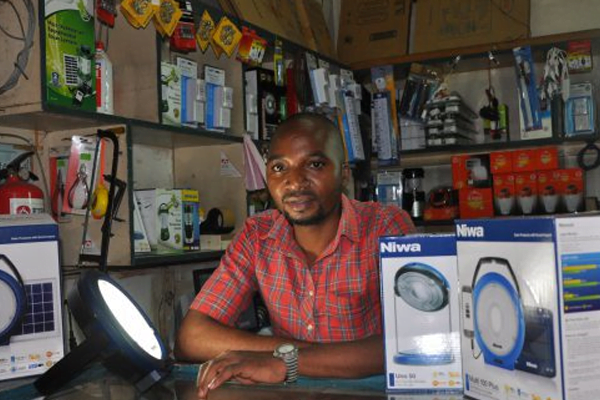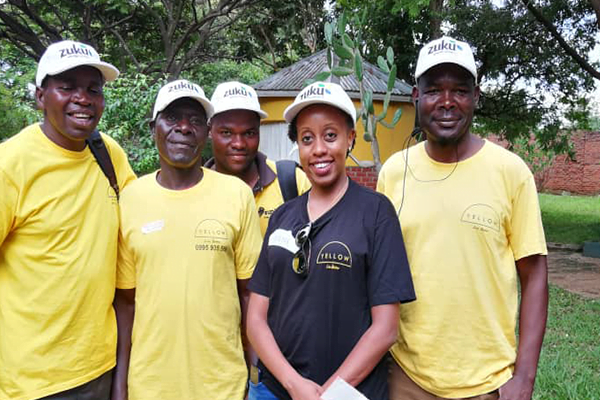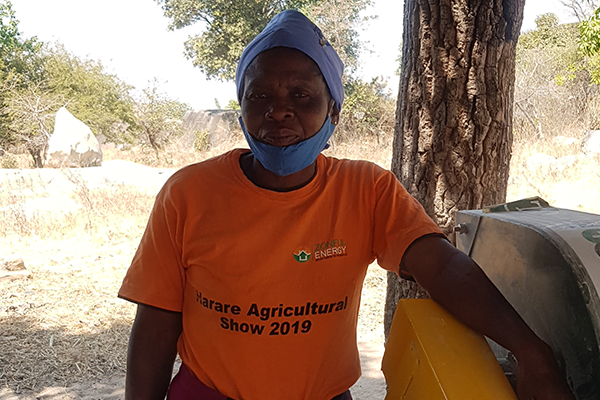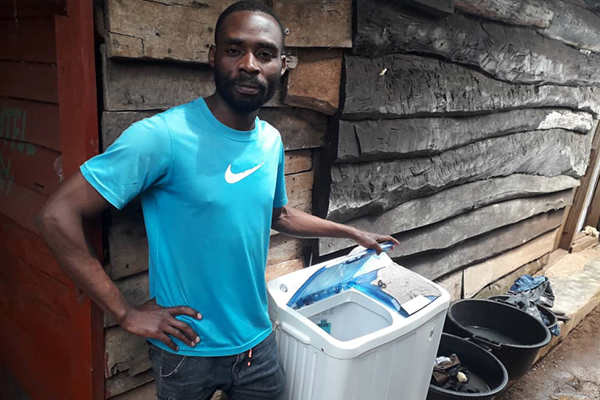
EEP Funding Helps Sollatek to Sell Over 100,000 Solar PV Products to Last Mile Bottom of Pyramid Customers in Rural Kenya
A majority of the off-grid rural population in Kenya lives in areas inaccessible due to poor road infrastructure and hostile terrain. The rural bottom of the pyramid (BoP) also has a very limited disposable income and knowledge of renewable energy, which hinders the adoption of modern solar energy technologies. Despite the pay-as-you-go models that help to fill the financial gap by spreading out the upfront payment for more expensive systems, the rural families still struggle to afford the down payment. Overcoming the last mile distribution challenge to provide affordable products requires innovative solutions.
A Kenyan company Sollatek Electronics wanted to tackle the challenges by presenting a range of affordable and quality solar power products as a viable solution to serve the substantially hard to reach rural Kenyan population. In 2015 Sollatek was awarded an EEP grant to scale up their sales network through a direct business model that builds up a qualified sales force across the country.
Sollatek Electronics Kenya Limited has been operating in the East African market for over 30 years since 1985 with the head office in Mombasa, Kenya and a sister company in Dar Es Salaam, Tanzania. The company operates as a wholesale & distribution outfit, partnering with innovative technology manufacturers and selling their products through a region-wide network of distributors to the last mile customers. During the EEP project, Sollatek successfully trained and supported a network of 60 Solar Entrepreneurs selling Sollatek’s wide range of affordable and quality solar lanterns and solar home systems to new markets in areas unfamiliar with solar technology. Through selling over 100,000 units of solar lanterns and solar home systems during the project, Sollatek has made a direct impact on lives of over half a million individuals across Kenya, contributing significantly to energy security, health, education and economic opportunities for under-served rural off-grid populations. In rural Kenya, where only 12.6% (according to World Bank and SE4ALL of the population has access to electricity, solar lanterns can transform lives. By purchasing a solar lantern the families take the first step on an energy ladder towards full electrification. In addition to benefits from replacing unsustainable and dangerous kerosene to more clean and economic options, school children gain reliable bright light to do evening homework, which results in better school performance.
Key to success is a passionate and productive team
Sollatek’s EEP project was based on a two-month training program in several regions of Kenya, focusing not only on the sales of solar lanterns, but also on the distribution model. By training a network of locally recruited entrepreneurs and supporting them through marketing, technical and operational tasks, Sollatek provided valuable skills trainings and employment in areas with high unemployment rates and low levels of education. At the end of the project each one of the 60 solar entrepreneurs was equipped to become an independent sales agent or to continue as Sollatek field staff.
In Sollatek’s own words, one of the engines that has been driving the company’s growth and the success of the EEP project in the expanding and competitive market for solar off-grid products is the organizational culture and the employees who are passionate towards their work, knowledgeable about the off-grid market and understanding of the customer needs in the bottom of the pyramid. A strong, supportive and effective management team with oversight and open communication is also a key element in achieving results. A group of core entrepreneurs who were committed since the beginning have grown as salespeople in their understanding of sales techniques, balancing workload, reporting and handling difficult situations between distributors and customers. The entrepreneurs who initially knew very little about solar energy and less about climate change or the hazards of kerosene, now feel that they are helping their communities become economically and energy independent.
Women entrepreneurs drive sales and encourage more female participation Encouraging women entrepreneurs was not originally highlighted in the project plans, but supporting women on every level of sales operations turned out to be a major factor of success. Overtime, as women entrepreneurs proved their capability and sales skills, the network grew to be almost 50% female with at least one of the top 3 performers in monthly sales being a woman. Female entrepreneurs have successfully tapped into women’s groups and Saccos (Savings and Credit Cooperative Organizations), schools and community organizations expanding the target beyond the traditional solar lantern customer group, who are often male shop or kiosk owners. The female entrepreneurs were able to find different routes and more profitable strategies to market the products. Highlighting women’s successes triggered other women to be more vocal and created a female friendly atmosphere in trainings, bi-weekly meetings and other group interactions. Most importantly, seeing women driving sales also encouraged female end-users to actively participate in purchase decisions and controlling their household’s energy needs.
Moving forward in the dynamic solar lantern industry
Solar lantern industry is a young and dynamic sector, which makes it both an exciting space to explore innovative models, technologies and structures, but also a demanding and constantly changing playing field as different models take off and others are dropped. One of Sollatek’s lessons learnt is that instead of one single model, a flexible layering of different models and partnerships delivers a better last mile distribution infrastructure.
With the EEP funds Sollatek was enabled to truly develop and invest in the distribution model to find the most successful combination. Sollatek is excited about the scale up and expansion opportunities, and confident that with slight modifications, this distribution model could be replicated in other East African countries and the more remote areas of Kenya. As large part of the EEP project’s success was incorporating women into every level of operations, this approach is also integrated into the business plan for moving forward. Overall, Sollatek has already sold 700,000 portable solar lighting products in Kenya, and aims to remain in the forefront of delivering quality renewable energy products to the truly last mile customers.
Building an Inclusive Approach to Energy Access
Maya Khonje-Stewart, co-founder & COO of Yellow: SHS distributor in Malawi...
Solar Lighting Brings Safety and Productivity
Zonful Energy's Customers in Zimbabwe emphasise improved safety and productivity...
Island Mini-grid Powers Local Businesses
Local entreprenuers on Kitobo Island highlight opportunities from Absolute Energy's mini-grid...





